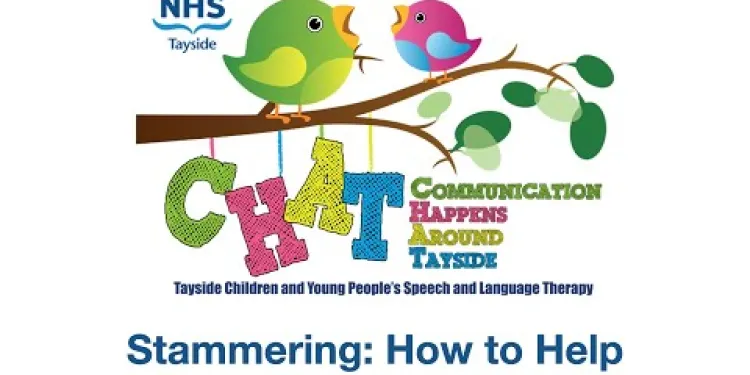Find Help
More Items From Ergsy search
-

Adam's story on stammering - Therapy
Relevance: 100%
-

Will's story on having therapy - Stammering
Relevance: 99%
-

Stammering: myths about the cause of stammering
Relevance: 78%
-

Stammering: How to Help
Relevance: 76%
-

Giving Voice - Stammer and Fluency Problems
Relevance: 73%
-

Stammering myth 4: You should ignore a child's stammer
Relevance: 72%
-

My Stammering Child
Relevance: 72%
-

Why do some children stammer?
Relevance: 70%
-

I don’t need to be fixed – what I wish the world understood about stammering
Relevance: 61%
-

Practical strategies to support young children who stammer
Relevance: 61%
-

What is radiation therapy?
Relevance: 38%
-

Hormone Therapy for prostate cancer
Relevance: 36%
-

Plantar Fascia Cold Therapy
Relevance: 36%
-

What is ketamine infusion therapy?
Relevance: 36%
-

What is antiretroviral therapy (ART)?
Relevance: 35%
-

Is focal therapy an option for prostate cancer?
Relevance: 35%
-

Can therapy help individuals with ADHD?
Relevance: 34%
-

What are some common therapies for autism?
Relevance: 34%
-

Can prostate cancer be treated with targeted therapy?
Relevance: 33%
-
What is the role of therapy in treating eating disorders?
Relevance: 33%
-

Can Music Therapy Be the Key to Reducing Anxiety?
Relevance: 33%
-

Will I need physical therapy after a hip replacement?
Relevance: 33%
-

Can Paillon treatment be used alongside traditional therapies?
Relevance: 31%
-

Is hormone replacement therapy safe for menopause masking?
Relevance: 30%
-

How does hormone therapy help in treating prostate cancer?
Relevance: 30%
-

How does cognitive-behavioral therapy help with health-related anxiety?
Relevance: 29%
-

What is the role of hyperbaric oxygen therapy in treating flesh-eating disease?
Relevance: 28%
-

Aquablation Therapy - Minimally Invasive Enlarged Prostate Treatment - Ramsay Health Care UK
Relevance: 28%
-

Can physical therapy help whiplash?
Relevance: 28%
-

Charlie and Rupert on their journey with Spinal Muscular Atrophy and Zolgensma Gene Therapy
Relevance: 27%
-

Can hormone replacement therapy (HRT) impact dementia risk?
Relevance: 27%
-

Information for all cancer patients receiving Chemotherapy or Targeted Therapy at HDFT.
Relevance: 26%
-

Talking therapy 'should be offered before pills' for people with insomnia | NHS Behind the Headlines
Relevance: 26%
-

Aquablation Therapy takes around 45 minutes to do based upon the patients prostate size
Relevance: 26%
-

How does PEP therapy work in air physiotherapy?
Relevance: 25%
-

How long is Wegovy therapy typically recommended?
Relevance: 20%
-

How is advanced prostate cancer treated?
Relevance: 12%
-

Can sunbed tanning help with Seasonal Affective Disorder (SAD)?
Relevance: 12%
-

What are the treatment options for whiplash?
Relevance: 11%
-

Stroke - Speech and Language Therapist's Experience
Relevance: 11%
Will's Journey with Stammering Therapy
Introduction to Stammering
Stammering, also known as stuttering, is a speech disorder that affects the flow of speech. Individuals who stammer may repeat sounds, syllables, or words, and their speech might be interrupted by unintentional pauses. This can be a significant challenge in both personal and professional settings. In the United Kingdom, over 1.5 million people are estimated to have a stammer.
Will's Early Struggles
Will, a 25-year-old from Manchester, began exhibiting signs of stammering at a young age. During his school years, he faced numerous challenges, including difficulty participating in class, making friends, and avoiding social gatherings. These experiences profoundly affected his self-esteem and confidence.
Decision to Seek Therapy
As an adult, Will recognised the impact his stammer was having on his life and decided it was time to seek help. After thorough research and encouragement from his family, he approached a speech and language therapist in Manchester and embarked on his journey to overcome stammering.
Therapy Techniques and Approaches
Will’s therapist employed several techniques tailored to his needs, including:
- Breathing Exercises: Techniques to control breathing, promoting fluency in speech.
- Speech Techniques: Methods such as slow speech, gentle onsets, and controlled articulation.
- Cognitive Behavioural Therapy (CBT): Addressing the psychological aspects of stammering, reducing anxiety and negative thought patterns.
Progress and Achievements
With consistent effort and support, Will began to notice significant improvements in his speech. He became more confident in social situations, participated actively at work, and even took up public speaking engagements. His journey transformed his outlook on life and communication.
Conclusion and Encouragement
Will’s story serves as inspiration for many who struggle with stammering. Therapy, patience, and perseverance can lead to remarkable changes. In the UK, various resources and support groups are available for individuals seeking help. Will’s experience highlights the importance of seeking professional guidance and not giving up on the journey toward fluent speech.
Will's Journey with Stammering Therapy
Introduction to Stammering
Stammering, also called stuttering, is a problem with talking. People who stammer may repeat sounds or words and stop speaking without meaning to. This can make it hard to talk to others at home or at work. In the United Kingdom, more than 1.5 million people have a stammer.
Will's Early Struggles
Will is 25 years old and lives in Manchester. He started stammering when he was very young. In school, he found it hard to speak in class, make friends, and go to parties. This made him feel bad about himself.
Decision to Seek Therapy
When Will grew up, he saw that his stammer was making life difficult. He decided he needed help. His family supported him, and he found a speech therapist in Manchester to help him with his stammer.
Therapy Techniques and Approaches
Will’s therapist used different methods to help him:
- Breathing Exercises: Ways to help Will control his breathing so he could speak better.
- Speech Techniques: Tips like speaking slowly, starting words gently, and clear talking.
- Cognitive Behavioural Therapy (CBT): Helping Will feel less worried and think positively about speaking.
Progress and Achievements
With hard work and support, Will's speech got better. He felt more sure of himself in social situations, did better at work, and even started speaking in front of groups. This changed how he saw talking and life.
Conclusion and Encouragement
Will’s story shows that people with stammering can make big progress. Therapy, patience, and not giving up can help a lot. In the UK, there are many places and groups that can help people who stammer. Will’s journey shows how important it is to get professional help and keep trying for smoother speech.
Frequently Asked Questions
What is stammering?
Stammering, also known as stuttering, is a speech disorder that involves disruptions or disfluencies in a person's verbal expressions.
How did Will first realise he had a stammer?
Will first noticed he had a stammer during his childhood when he struggled with speech fluency, particularly under stress.
What led Will to seek therapy for his stammer?
Will sought therapy after facing challenges in social situations and at work due to his stammer, which affected his confidence.
What kind of therapy did Will try for his stammer?
Will tried speech and language therapy which focuses on techniques and strategies to improve speech fluency.
How long did Will undergo therapy?
Will underwent therapy for several months, although the duration can vary based on individual needs and progress.
What techniques or strategies did Will learn in therapy?
Will learned various breathing exercises, slow speech techniques, and ways to handle stressful speaking situations.
Did therapy help Will with his stammer?
Yes, therapy significantly helped Will by improving his speech fluency and boosting his confidence in social interactions.
Is stammering common in the UK?
Stammering affects about 1% of the UK’s population, which equates to around 600,000 people, according to the British Stammering Association.
Can everyone benefit from speech therapy for stammering?
While many people benefit from speech therapy, outcomes can vary. Individual commitment and the therapist's approach play crucial roles.
What advice does Will give to others with a stammer?
Will advises others to seek professional help without hesitation and to practice patience and self-compassion during the process.
Are there support groups for stammering in the UK?
Yes, there are several support groups and resources, including the British Stammering Association, that offer community and guidance.
How can family and friends support someone with a stammer?
Listening patiently, avoiding finishing sentences for them, and encouraging a relaxed speaking environment are helpful ways to support.
Can stammering be cured?
There’s no definitive cure for stammering, but with therapy and support, individuals can manage their speech more effectively.
Did Will find any specific social situations particularly challenging due to his stammer?
Yes, Will found situations such as job interviews, public speaking, and social gatherings particularly challenging.
What changes has Will noticed in his life post-therapy?
Post-therapy, Will has noticed improved speech fluency, increased self-confidence, and better social interactions.
What is stammering?
Stammering is when someone finds it hard to speak smoothly. They might repeat words or sounds. They could also pause a lot when talking.
Here are some ways to help:
- Be patient and listen carefully.
- Don't rush or interrupt them.
- Encourage them to speak slowly.
- Use apps or games that help with speaking.
Stammering, also called stuttering, is when someone finds it hard to talk smoothly. They might have trouble getting words out.
How did Will first know he had trouble speaking?
Will first saw he had trouble speaking when he was a child. His words would get stuck, especially when he felt worried or stressed.
Why did Will decide to get help for his stutter?
Will went to talk to a therapist. He was having a hard time talking with people and doing his job. This was because he had a stammer that made him feel less sure of himself.
What type of help did Will try for his stutter?
Will went to a special doctor to help him talk. This doctor teaches ways to make talking easier.
How long did Will go to therapy?
Tip: Use a calendar to count the days or weeks.
Will went to therapy for a few months. How long someone goes to therapy can be different for each person. It depends on what they need and how they are doing.
What did Will learn in therapy to help him?
Will learned how to do different breathing exercises. He also learned how to speak slowly and how to stay calm when talking in a difficult situation.
Did talking with a therapist help Will with his stammer?
Yes, therapy really helped Will. It made his talking much smoother and made him feel braver when talking to other people.
Do many people in the UK stammer?
A stammer is when talking is hard because words or sounds repeat or get stuck. Lots of people have a stammer. This is common. Children and adults can stammer. It is okay to talk slowly. Deep breaths can help. Speech therapists are people who help with speech problems.
Stammering is when someone has trouble speaking smoothly. It affects about 1 out of every 100 people in the UK. That's around 600,000 people who stammer. The British Stammering Association says this.
Can everyone get help from speech therapy for stammering?
Speech therapy helps many people, but results can be different for everyone. It's important for the person to try hard and for the therapist to use the right methods.
What tips does Will give to others who stutter?
Will says to ask a doctor or counselor for help if you need it. Do not wait. Be kind to yourself and take your time while getting better.
Can people who stammer get help from groups in the UK?
Yes, there are groups in the UK where people who stammer can go for help and support. These groups let people talk to others who stammer too. They can share tips and make new friends. Some groups even meet online! You can find these groups by searching on the internet or asking a grown-up for help.
Yes, there are groups and places that can help. One of them is the British Stammering Association. They can give you support and advice.
How can family and friends help someone who stammers?
Here are some easy ways to help:
- Be patient. Wait for the person to finish speaking without interrupting.
- Listen carefully. Show that you care about what they are saying.
- Speak to them in a calm and slow voice.
- Keep eye contact. This shows that you are listening.
- Encourage and praise them for speaking.
- Do not finish their sentences for them. Let them speak at their own pace.
Using these tools and tips can make it easier for everyone.
It helps to listen carefully without interrupting. Try not to finish their sentences for them. Make the place calm and friendly for talking.
Can stammering go away?
Some people find it hard to talk smoothly. This is called stammering.
For some, stammering gets better as they grow up. Others might need help.
Working with a speech therapist can help. They teach you ways to talk more easily.
There are also apps and tools that can help you practice speaking.
It is important to be patient and keep trying.
There is no sure way to stop stammering. But, with help and practice, people can talk better.
Did Will have trouble talking in some social situations because of his stammer?
Yes, Will found things like job interviews, talking in front of people, and meeting with others very hard.
What differences has Will seen in his life after going to therapy?
After Will started therapy, he noticed some changes in his life. Here are some simple ways to think about it:
- Will feels more happy.
- He understands his feelings better.
- He talks to other people more easily.
- He is less worried about things.
If you want to help someone like Will, here are some things you can do:
- Write down your feelings in a diary.
- Talk to a friend or family member you trust.
- Take deep breaths when you feel stressed.
- Try to do something fun every day.
Remember, it's okay to ask for help if you need it!
After therapy, Will talks more smoothly, feels better about himself, and makes friends more easily.
Useful Links
This website offers general information and is not a substitute for professional advice.
Always seek guidance from qualified professionals.
If you have any medical concerns or need urgent help, contact a healthcare professional or emergency services immediately.
Some of this content was generated with AI assistance. We’ve done our best to keep it accurate, helpful, and human-friendly.
- Ergsy carfully checks the information in the videos we provide here.
- Videos shown by Youtube after a video has completed, have NOT been reviewed by ERGSY.
- To view, click the arrow in centre of video.
- Most of the videos you find here will have subtitles and/or closed captions available.
- You may need to turn these on, and choose your preferred language.
- Go to the video you'd like to watch.
- If closed captions (CC) are available, settings will be visible on the bottom right of the video player.
- To turn on Captions, click settings .
- To turn off Captions, click settings again.
More Items From Ergsy search
-

Adam's story on stammering - Therapy
Relevance: 100%
-

Will's story on having therapy - Stammering
Relevance: 99%
-

Stammering: myths about the cause of stammering
Relevance: 78%
-

Stammering: How to Help
Relevance: 76%
-

Giving Voice - Stammer and Fluency Problems
Relevance: 73%
-

Stammering myth 4: You should ignore a child's stammer
Relevance: 72%
-

My Stammering Child
Relevance: 72%
-

Why do some children stammer?
Relevance: 70%
-

I don’t need to be fixed – what I wish the world understood about stammering
Relevance: 61%
-

Practical strategies to support young children who stammer
Relevance: 61%
-

What is radiation therapy?
Relevance: 38%
-

Hormone Therapy for prostate cancer
Relevance: 36%
-

Plantar Fascia Cold Therapy
Relevance: 36%
-

What is ketamine infusion therapy?
Relevance: 36%
-

What is antiretroviral therapy (ART)?
Relevance: 35%
-

Is focal therapy an option for prostate cancer?
Relevance: 35%
-

Can therapy help individuals with ADHD?
Relevance: 34%
-

What are some common therapies for autism?
Relevance: 34%
-

Can prostate cancer be treated with targeted therapy?
Relevance: 33%
-
What is the role of therapy in treating eating disorders?
Relevance: 33%
-

Can Music Therapy Be the Key to Reducing Anxiety?
Relevance: 33%
-

Will I need physical therapy after a hip replacement?
Relevance: 33%
-

Can Paillon treatment be used alongside traditional therapies?
Relevance: 31%
-

Is hormone replacement therapy safe for menopause masking?
Relevance: 30%
-

How does hormone therapy help in treating prostate cancer?
Relevance: 30%
-

How does cognitive-behavioral therapy help with health-related anxiety?
Relevance: 29%
-

What is the role of hyperbaric oxygen therapy in treating flesh-eating disease?
Relevance: 28%
-

Aquablation Therapy - Minimally Invasive Enlarged Prostate Treatment - Ramsay Health Care UK
Relevance: 28%
-

Can physical therapy help whiplash?
Relevance: 28%
-

Charlie and Rupert on their journey with Spinal Muscular Atrophy and Zolgensma Gene Therapy
Relevance: 27%
-

Can hormone replacement therapy (HRT) impact dementia risk?
Relevance: 27%
-

Information for all cancer patients receiving Chemotherapy or Targeted Therapy at HDFT.
Relevance: 26%
-

Talking therapy 'should be offered before pills' for people with insomnia | NHS Behind the Headlines
Relevance: 26%
-

Aquablation Therapy takes around 45 minutes to do based upon the patients prostate size
Relevance: 26%
-

How does PEP therapy work in air physiotherapy?
Relevance: 25%
-

How long is Wegovy therapy typically recommended?
Relevance: 20%
-

How is advanced prostate cancer treated?
Relevance: 12%
-

Can sunbed tanning help with Seasonal Affective Disorder (SAD)?
Relevance: 12%
-

What are the treatment options for whiplash?
Relevance: 11%
-

Stroke - Speech and Language Therapist's Experience
Relevance: 11%


